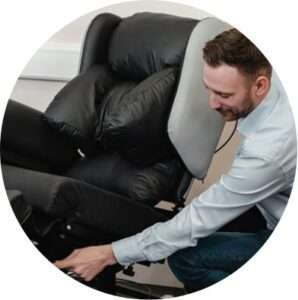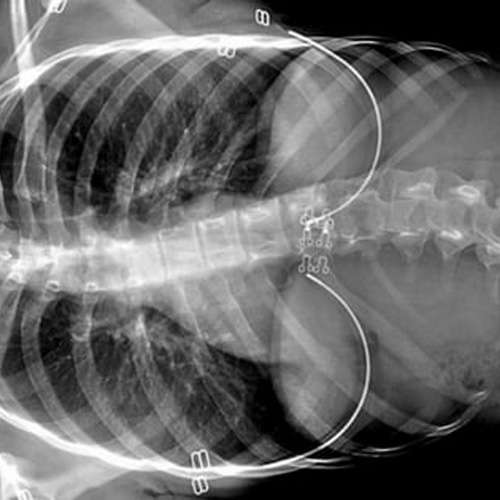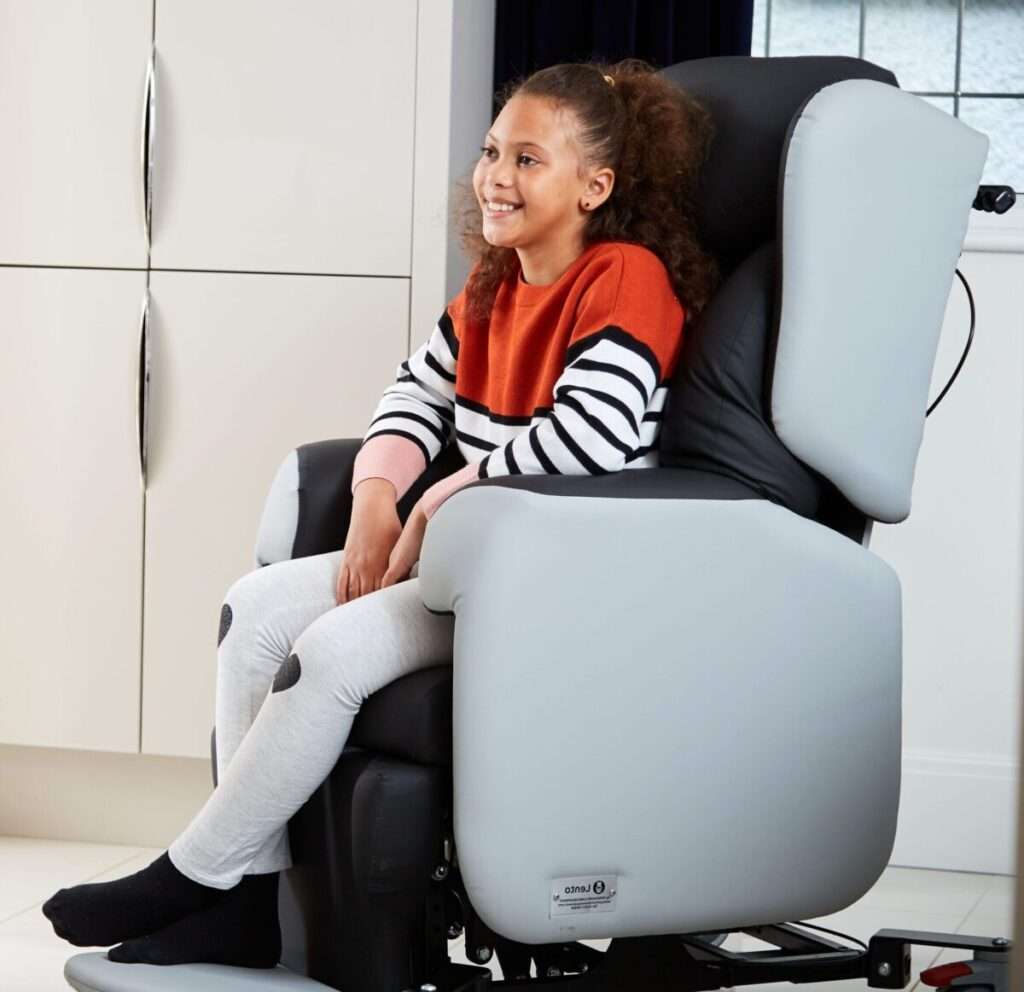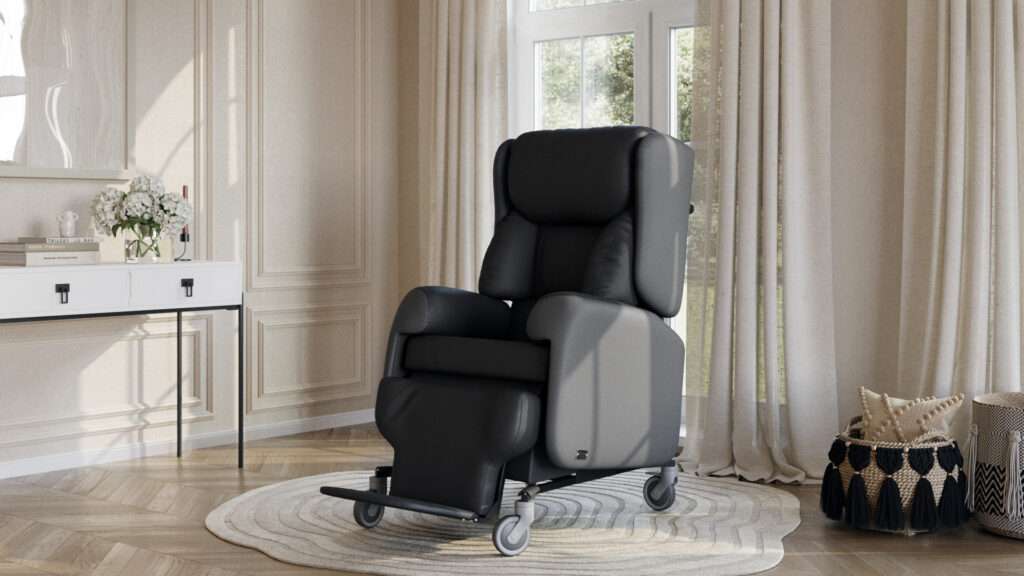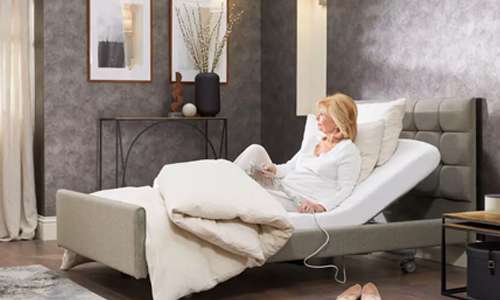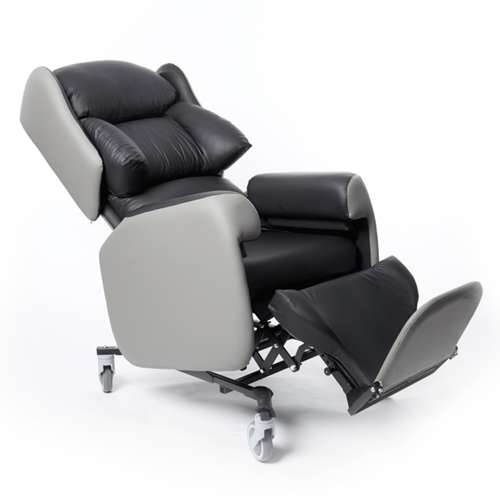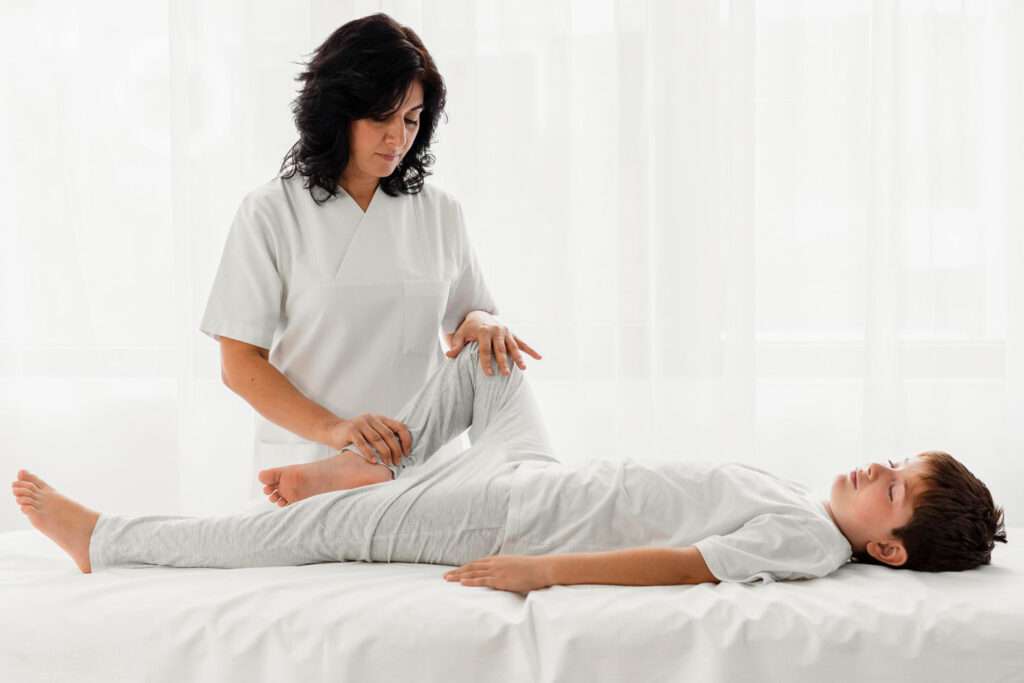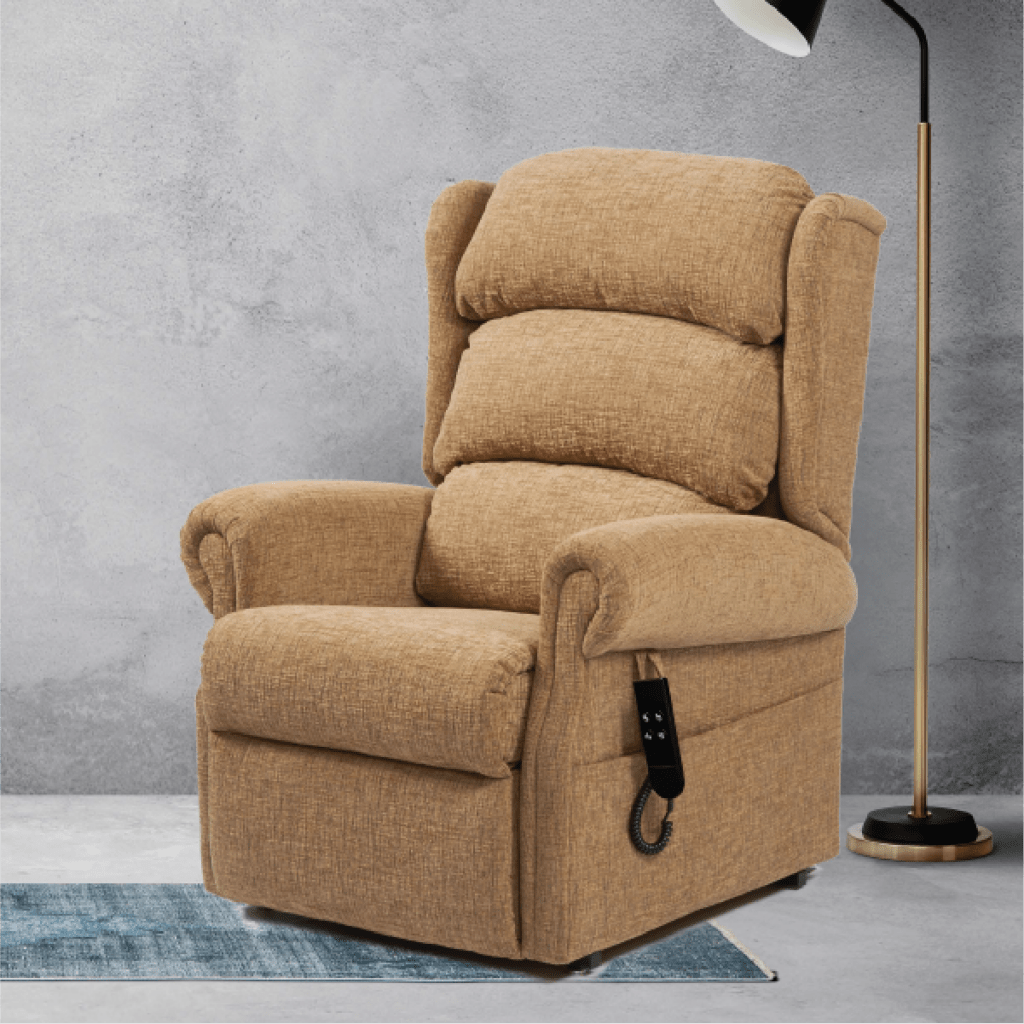Scoliosis is a condition characterised by a sideways curvature of the spine, while spinal asymmetry refers to irregular alignment or imbalance in the spinal structure, which may or may not require corrective treatment. Both conditions can affect posture, cause muscle tension, and lead to chronic back pain.
Sitting for long periods due to poor mobility or long-term health problems, whether at work or home, can exacerbate these issues. Therefore, selecting a chair designed for good spinal health is critical for the long-term health and comfort of people with these conditions.
In this blog we look at how to choose the best armchair for scoliosis and spinal asymmetry.
Jump straight to...
Arrange an assessment
What is Scoliosis?
Roughly 10% of the population have a small sideways curve of less than 10 degrees which has no consequence to long-term health. Scoliosis occurs when the curve is greater than 10 degrees, and is most common in the thoracic and lumber areas.
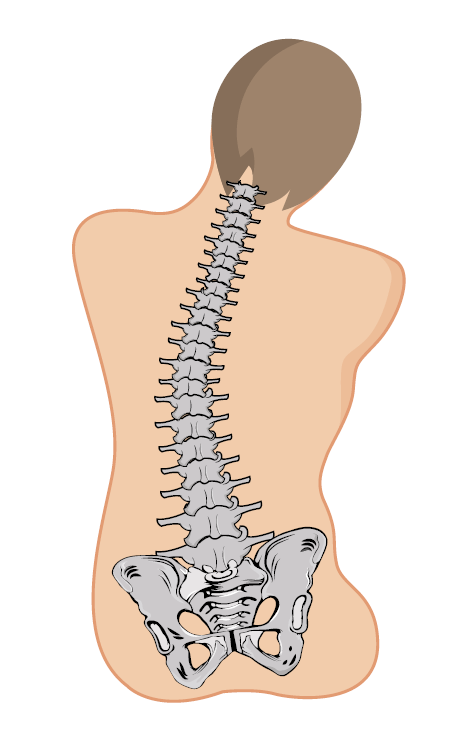
Scoliotic spine
Types of scoliosis
Type of Scoliosis | Description |
Idiopathic | Inherited genetically so exact cause unknown |
Structural | Spine is rotated (twisted) as well as having a sideways curve. Not reversible without treatment. |
Functional | Sideways curve only, is reversible by addressing underlying causes |
Neuromuscular | Causes by muscular disorders such as cerebral palsy or spina bifida. |
Grading of scoliosis
The Cobb Angle is used to measure the grading of scoliosis, and provides the following gradings:
- Mild (10 to 25 degrees)
- Moderate (25 – 40 degrees)
- Severe (40 – 80 degrees)
- Very severe (80 degrees)
Moderate to severe cases require specialist seating such as care chairs.
Effects of scoliosis and spinal asymmetry
The symptoms of these conditions are shown with postural presentation, such as uneven shoulders, or a lean to one side. A scoliotic spine often leads to an oblique (tilted) pelvis, as illustrated in the diagram above, which results in a windswept legs. Scoliosis doesn’t typically cause back pain, but can do in some cases.
The effects can worsen with age as the spine matures, so it is important to have a care chair that can be adjusted to accommodate this condition into the future.
Optimal Sitting Posture for Scoliosis and Spinal Asymmetry
Sitting with scoliosis is predominantly about managing the spinal positioning and making postural improvements where possible, and lateral supports are paramount to achieving both of these.
By including these postural supports in the armchair, you can help to counter-support both sides of your client and aim to alleviate the twist and bending that scoliosis causes.
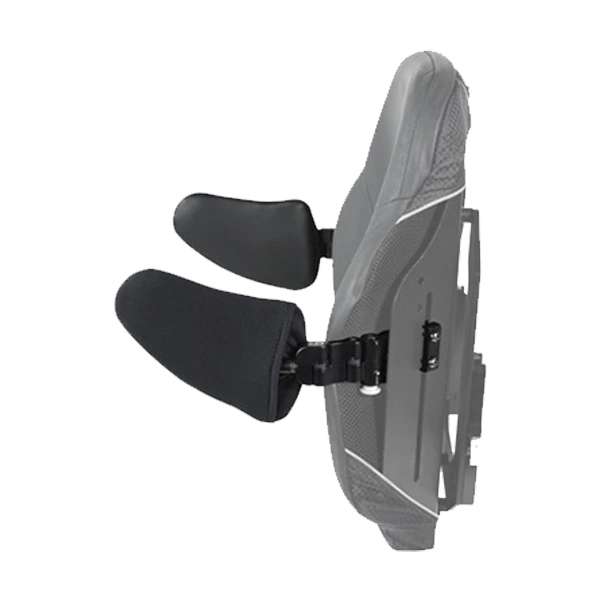
Lateral trunk supports
Achieving a good sitting posture is crucial to prevent pressure sores that can be caused by leaning or uneven weight distribution. Follow these guidelines to reduce strain and support your spine:
- Feet Flat on the Floor
Ensure your feet rest flat on the floor or a footrest, with knees at a 90° angle to reduce lower back pressure. Distributing some of your body weight through your feet reduces pressure on the buttocks and base of spine.
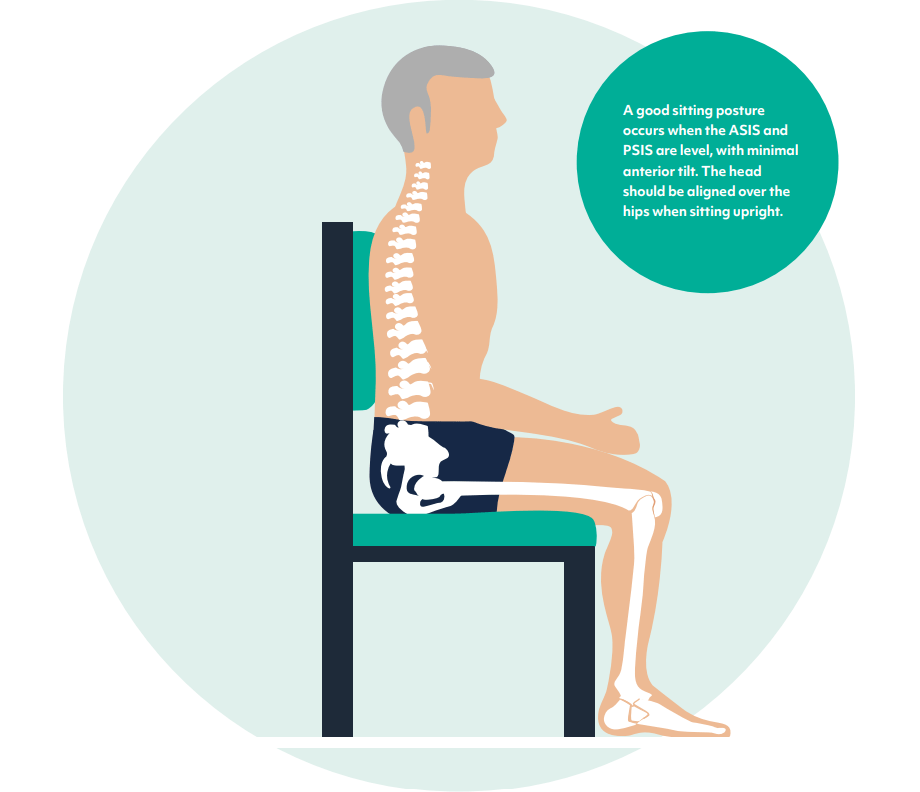
- Engage Your Core
Slightly engage your abdominal muscles to support your lower back and minimise slouching. If core strength is weak, lateral supports will help to keep your trunk straighter and prevent you from slumping sideways.
- Neutral Spine Alignment
Sit with your back against the chair, and ensure your spine retains its natural curves. Avoid leaning forward or tilting sideways.
- Elbows at 90°
Keep your elbows bent at 90° to prevent shoulder tension.
- Periodic Movement
Stand, stretch, or walk every 30 minutes to reduce spinal stiffness and improve circulation.
- Recline Function
Ensure your chair includes a recline function that incorporates tilt-in-space, so that the weight of the trunk is spread further up the back, and not just concentrated around the lower back.
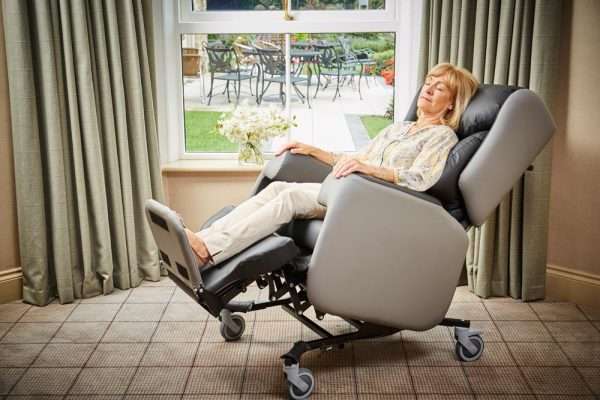
Key Seating Features for Scoliosis and Spinal Asymmetry
- Lumbar Support
When finding the best chair for scoliosis, look for chairs with adjustable lumbar support to promote the natural S-shape curvature of the spine. Proper lumbar support minimises pressure on the lower back, preventing slouching and further misalignment.
- Adjustability
Height, seat depth, armrest, and backrest adjustability ensure a chair conforms to your unique spinal shape. Ergonomic chairs with multi-adjustment capabilities are highly recommended for scoliosis patients.
Adjustable backrests are also useful to find the right backrest type and cushion configuration for each person, that supports their upper body in the best way possible.
- Tilt in Space
A reclining backrest with a tilt-in-space mechanism allows periodic postural adjustments. Tilt-in-space tilts the person back in the chair, shifting their centre of gravity and spreading pressure more evenly across the back of the body. Research indicates that reclining slightly at 110°–130° relieves pressure on spinal discs and improves sitting comfort for scoliosis patients.
Tilt-in-space functionality helps to maintain good head positioning. By tilting the chair back, this allows gravity to aid in the prevention of neck flexion.
- Lateral Support
For people with scoliosis, it is more common to have loose/removable lateral supports in chairs, as it allows the carer or the individual to reposition the support accordingly. However, it is possible to have built-in/fixed supports, but this is dependent on the person’s needs.
- Neck and Head Support
Moving up the body, neck and head supports are also good to include in armchairs for people with scoliosis. This again will help to stop you from slumping sideways, and therefore minimise any possibility of worsening your scoliosis.
The neck and lateral supports will help to facilitate a best-as-possible neutral midline from the head right down to the pelvis, and there should be no severe neck flexion.
- Pelvic Support
Chairs that maintain a neutral pelvic position are beneficial for spinal alignment. A seat with a slight forward tilt can reduce pelvic rotation, which is crucial for individuals with scoliosis.
- Cushioning and Material
Firm, high-density foam cushions provide support without flattening over time. Memory foam with breathable mesh is particularly useful for comfort and reducing pressure on bony prominences.
Best Care Chairs for Spinal Asymmetry and Scoliosis
Lento Trio
The Lento Trio is a highly customisable care chair for people with scoliosis. The three cushioned arms that form the upper backrest section can be adjusted individually, to provide complex postural support and correct spinal asymmetries.

Cura Contour
The Cura Contour chair uses manual tilt-in-space action and features a multi-adjustable backrest. The backrest can be adjusted in height, depth and angle rotation to accommodate almost any spinal deformity.
Lento Care Chair
As a general rule, if an individual with scoliosis is hoisted, they will require a care chair as this allows a mobile hoist to slide underneath the chair making it easier to hoist a person in and out of the chair using a sling.
The Lento Care Chair is an ideal specialist seating solution for scoliotic spines. The hospital spec chair includes lateral, neck, and head supports, as well as tilt-in-space to relieve pressure and guard against skin degradation.
The lateral waterfall backrest comes as standard, supporting the upper body and the backrest options which include a full cocooning option can be used across the Lento range. Wedges can be added to adjust level of lateral support on each side, depending on the severity of the lean.
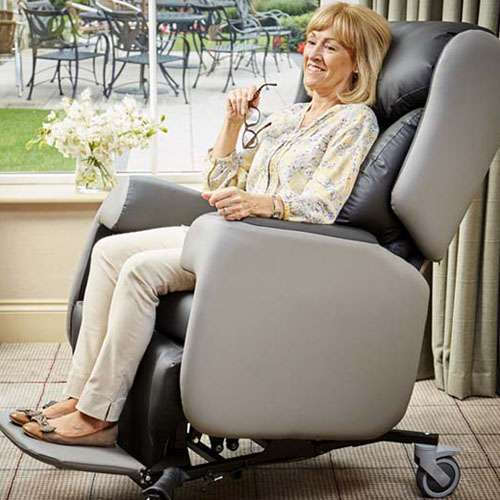
Lento Care Chair
Lento Mobile
The Lento Mobile Riser Recliner has a range of adjustability and all the relevant accessories needed to effectively handle the care requirements of people with scoliosis. Fixed lateral support or backrest wedges can be added for customised lateral support, or the client can choose from the various lateral backrests available.
If an individual has a good range of mobility, the right solution may be a rise and recline chair which is close to the floor and is recommended if the person sitting in the chair does not need hoisting.
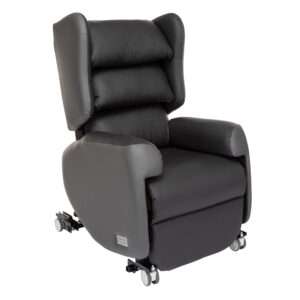
Lento Mobile riser recliner
Conclusion
Living with scoliosis or spinal asymmetry doesn’t mean you have to compromise on comfort or health while sitting. By investing in the right chair, adopting proper posture, and incorporating movement into your day, you can protect your spine and enhance your overall well-being.
To find your ideal fit, book a no obligation seating assessment with one of our friendly and experienced Occupational Therapists or seating specialists. They can help you create the ideal specialist seating solution that is tailored to your specific needs as individual cases can vary.
We hope that this guide will help to clarify what should be considered in chairs for scoliosis sufferers. For an idea of what you can expect from a seating assessment, take a look at our guide to specialist seating & assessments.
Arrange an assessment
FAQs
What is scoliosis?
Scoliosis is a condition where the spine curves sideways, often appearing as an “S” or “C” shape. It differs from spinal asymmetry, which refers to uneven spinal alignment but not necessarily a diagnosable condition. Scoliosis can range in severity, from mild cases requiring little intervention to severe cases needing specialist care and seating.
What are the symptoms of scoliosis or spinal asymmetry?
Common signs include:
- Uneven shoulders
- A visible lean to one side
- Imbalance in weight distribution when sitting or standing
- An oblique (tilted) pelvis
While scoliosis itself doesn’t always cause back pain, misalignment and poor posture over time can lead to discomfort or secondary issues.
Why is a care chair important for scoliosis or spinal asymmetry?
Specialised care chairs provide essential postural support, helping to:
- Maintain spinal alignment
- Prevent pressure sores caused by uneven weight distribution
- Alleviate muscle tension and reduce back strain
- Adjust to changing needs as scoliosis progresses with age
What is tilt-in-space, and why is it helpful for scoliosis?
Tilt-in-space is a recline mechanism that tilts the entire chair backward while keeping the angle between the seat and backrest constant. This redistributes pressure across the body, reducing strain on the lower back and improving sitting comfort for individuals with scoliosis.
How do I know if a care chair is suitable for my condition?
Consult a healthcare professional, occupational therapist, or seating specialist. They can assess your specific needs, measure your spine’s curvature, and recommend a chair tailored to your condition.



